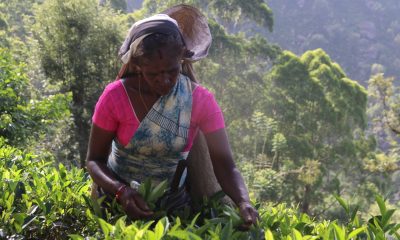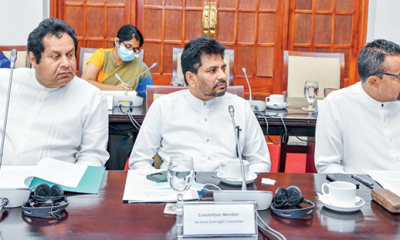Business
At long last pockets of support emerging for wage reforms in RPCs

The Planters’ Association of Ceylon (PA) has commended the government and trade union representatives for voicing preliminary support for long-overdue reforms to the archaic colonial-era daily attendance-based model in favour of a productivity-boosting modern Revenue Share Model.
The PA’s statement came following tentative support for wage reforms expressed by a high-ranking official of the Ceylon Workers’ Congress on social media. The official stated that a meeting was held with the President to propose a new revenue-sharing model, which aims to strike a balance between workers’ livelihoods and the sustainability of companies to address wage disparities.
While certain stakeholders have advocated limiting workers’ pay to a mere Rs. 1,000, over the years, PA has consistently championed and promoted a model that empowers workers to earn beyond this threshold. “For more than a decade, the PA has steadfastly maintained that the only way for Sri Lankan plantations to achieve operational sustainability is through the abolition of the daily attendance-based model in favour of a revenue share, similar to what has been practiced on tea smallholder estates with enormous success,” PA media spokesperson Dr. Roshan Rajadurai stated.
“While Trade Unions have typically been entrenched in their opposition to such reforms, we are encouraged to see the growing realisation among these stakeholders as to the value of this model for workers. Especially since more RPCs have been exposed to this model of working, they too are pushing Trade Unions to support these reforms to move ahead. We maintain that a revenue share model is the only viable way to ensure the feasibility of Sri Lanka’s tea industry without compromising on our obligation to provide our employees with a sustainable and rewarding livelihood.” Dr. Rajdurai added.
Under the revenue share model, workers stand to benefit from flexible working hours, allowing them greater control over their schedules and improved worker mobility. This flexibility enables other family members to contribute to the earning process, fostering a sense of economic empowerment within plantation communities.
According to PA, empirical evidence demonstrates that harvesters have significantly increased their output from 18 kgs to 24 kgs on estates where productivity-linked wages have been trialled, resulting in earnings surpassing Rs. 65,000. “Several RPCs that have already implemented this system have witnessed remarkable progress, with workers earning two to three times the wage they would have otherwise received. The Revenue Share Model’s flexible working hours have unlocked the potential for increased productivity in previously unharvested areas, addressing labour shortages and boosting overall plantation output,” added Dr. Rajadurai.
PA further emphasized that shifting from the daily wage model to the revenue share model also offers a solution to the escalating migration of labour, exacerbated by recent economic challenges. Currently, the workforce within RPCs has reduced from 300,000 to approximately 100,000. This transition can help reverse the alarming trend of labour migration out of the plantation sector, a critical step if Sri Lanka is to meet its state production targets.
PA is steadfast in its commitment to promoting the revenue share model as a progressive and transformative solution for the plantation sector. PA remains dedicated to ensuring that worker productivity is fairly rewarded, setting the stage for a brighter and more sustainable future for every plantation worker.
Business
In SL’s US-sparked tariff ordeals ‘Commonwealth may offer glimpse of hope’

The Commonwealth may offer ‘a glimpse of hope for Sri Lanka to overcome effects of US tariffs’, says former chairman, British- Sri Lanka Chamber of Commerce, London, Jayampathi Perera (Jay).
‘As Sri Lanka grapples with the high tariff imposed by the US’ Donald Trump administration, the Commonwealth, a voluntary association with 56 nations, many of which share historical ties and economic cooperation could offer a valuable life line for us in the long term. Although the US has given a period of just 90 days until they consider the next round of tariffs, now is the time for us to consider alternatives, Perera explained.
Perera added: ‘While the US has traditionally been a significant trading partner, especially for garments and tea exports, overdependence on such a single market can prove risky and we are already experiencing such a situation.
‘The Commonwealth provides a platform for trade diversification, allowing Sri Lanka to strengthen economic ties with other member countries, especially in Africa and elsewhere to conduct safe business with comparative ease.
‘These countries share legal frameworks and business standards and could not only ease market access but also present safe business platforms to establish joint ventures for the future.
‘Several Commonwealth nations have preferential trade agreements with developing member states.
‘For instance, the UK’s Developing Trading Scheme (DCTS) offers duty free access for many Sri Lankan goods. Provided we concentrate on a priority list of products that can compete with others in a highly competitive market, we may be able to offset some of the negative impacts of US tariffs.’
‘Beyond trade, Commonwealth collaboration also promotes investment, capacity building and technical assistance. Sri Lanka can leverage these partnerships to boost local industries, enhance value -added production and improve competitiveness in global markets.
‘Sri Lanka can tap into business networks and regional cooperation opportunities, particularly in South East Asia and Africa, to explore new markets and foreign direct investment.
‘During the recently held Commonwealth Trade and Investment Summit, April – 2025 London (CTIS), I did manage to present my own idea of presenting Sri Lanka as a viable manufacturing partner for the Commonwealth.
‘My idea was overwhelmingly shared by Lord Marlon, Chair of the organisation and was supported by many members of the Committee who immediately sat with me for a round table discussion.
‘Lord Marlon himself is very keen to provide assistance to Sri Lanka and has requested me to introduce any Sri Lankan company who needs assistance in identifying strong business partners in respective countries.
‘Although some in Sri Lanka might find fault with this idea of diluting our production capabilities by extending production into foreign territories, with the current global situation and the possibility of losing GSP+ status in the near future, for Sri Lanka this might be a lifeline to stay in business.
‘Furthermore, Sri Lankan apparel manufacturers with decades of experience behind them with access to reliable quality fabric,
supported by well-oiled logistics and compliance systems with most experienced managers, trainers and operational consultants’ can certainly add value to this whole process.
‘Considering some African countries such as Lesotho, Kenya, the Cameroons, Rwanda and many more benefiting from AGOA (African Growth and Opportunity Act), which allows duty-free access to the US for many goods, including textile and apparel, this avenue might provide joint ventures to maintain sales.
‘May be that’s why some major players of Sri Lanka’s apparel industry have already shifted their production to Kenya.
‘Sri Lanka’s engagement with the ommonwealth offers an alternative path forward and by strategically leveraging these partnerships, the nation could not only cushion the economic blow but also lay the foundation for a more diversified and resilient trade future.’
by Hiran Senewiratne
Business
CG Hospitality’s iconic ‘The Farm at San Benito’ joins prestigious Marriott Autograph Collection

In a strategic conversion idea brought to fruition, Marriott International Inc. and CG Hospitality signed an agreement to convert The Farm at San Benito, the well-renowned Philippines wellness retreat, to an Autograph Collection resort, as part of the portfolio of Premium Marriott Hotels.
The first in the Philippines expected to open its doors end Q3 2025, the Autograph Collection brand is home to a curated selection of individual boutique hotels, each chosen for their inherent craft and distinct perspectives on design and hospitality and immersive moments that leave a lasting imprint. The Farm at San Benito, Autograph Collection is slated to be Marriott’s 13th property in the Philippines and will also be part of Marriott Bonvoy, the global travel program from Marriott International.
The CG Corp’s leisure arm headed by Managing Director of CG Corp Global and CG Hospitality Global Rahul Chaudhary, has a total of 14 properties in Sri Lanka including the very first property that set the Group’s path into the global hospitality industry, the Taj Samudra in Colombo way back in 2001. “That foray into hospitality with the Taj Samudra and two properties in the Maldives paved the path for CG to partner with Sri Lanka’s largest hotel group – the Jetwing Hotels, headed by former Chairman of PATA, Hiran Corray,” states Chaudhary. “With three iconic properties, namely Jetwing Vil Uyana, Jetwing Sea and Jetwing Sigiriyaaya under the Jetwing umbrella, we inked our next Sri Lankan chapter in hospitality with Ceylon Hotels Corporation in partnership with Sanjeev Gardiner, with ten beautifully located properties around the country.”
In addition to a strong hospitality footprint in Sri Lanka, CG also made its maiden foray into the country’s financial industry in 2023 with the acquision of Union Bank and more recently, inked a vertical with John Keells Holdings for BYD vehicles in Sri Lanka.
Business
Aitken Spence Travels continues its leadership as the only Travelife-Certified DMC in Sri Lanka

Aitken Spence Travels, Sri Lanka’s leading destination management company, has once again been recertified with the prestigious Travelife Certified sustainability certification. This recognition underscores the company’s long-standing commitment to sustainability and health & safety best practices, reinforcing its leadership position in responsible tourism.
Travelife, established with the support of the European Commission, is the leading international sustainability certification for the travel sector. It is actively endorsed by renowned travel associations, including ABTA (The British Travel Association) and PATA (The Pacific Asia Travel Association). The Travelife standard is in full compliance with the Global Sustainable Tourism Council (GSTC) criteria. ISO 26000 covers Social Responsibility themes encompassing aspects such as the environment, labour relations, human rights and biodiversity. This globally respected certification sets a high standard for sustainability in the travel industry and is awarded to organisations that exhibit a genuine commitment to ethical business operations, environmental conservation, and social responsibility.
Aitken Spence Travels successfully met over 150 rigorous criteria during the certification process, demonstrating its unwavering dedication to environmental responsibility, community engagement, and sustainable tourism. From reducing its carbon footprint to fostering local community well-being, the company continues to integrate sustainability at the core of its operations.
-

 Sports6 days ago
Sports6 days agoOTRFU Beach Tag Rugby Carnival on 24th May at Port City Colombo
-

 News4 days ago
News4 days agoRanil’s Chief Security Officer transferred to KKS
-

 Opinion2 days ago
Opinion2 days agoRemembering Dr. Samuel Mathew: A Heart that Healed Countless Lives
-

 Features5 days ago
Features5 days agoThe Broken Promise of the Lankan Cinema: Asoka & Swarna’s Thrilling-Melodrama – Part IV
-

 Features6 days ago
Features6 days agoTrump tariffs and their effect on world trade and economy with particular
-

 News5 days ago
News5 days agoRadisson Blu Hotel, Galadari Colombo appoints Marko Janssen as General Manager
-

 Business4 days ago
Business4 days agoCCPI in April 2025 signals a further easing of deflationary conditions
-

 Features5 days ago
Features5 days agoA piece of home at Sri Lankan Musical Night in Dubai























